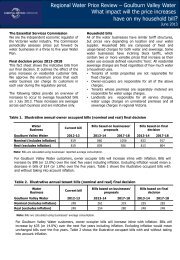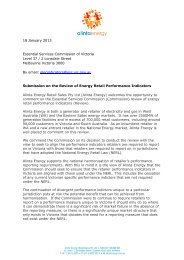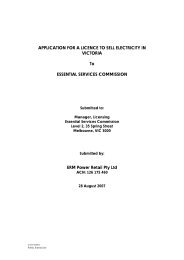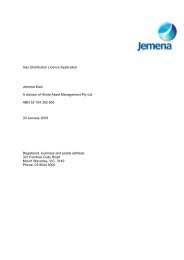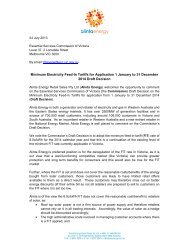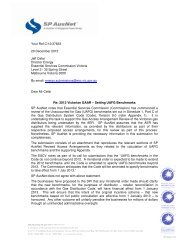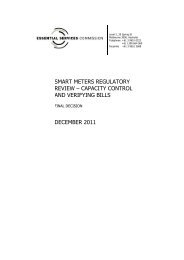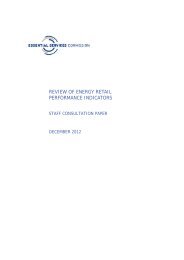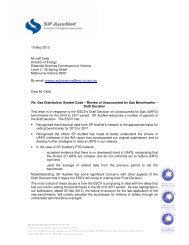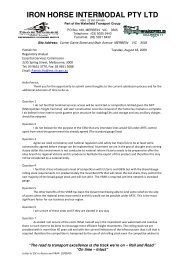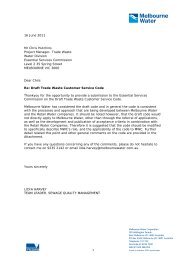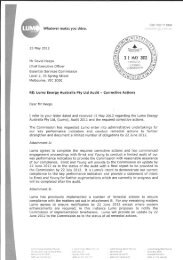Origin Energy Letter - Essential Services Commission
Origin Energy Letter - Essential Services Commission
Origin Energy Letter - Essential Services Commission
Create successful ePaper yourself
Turn your PDF publications into a flip-book with our unique Google optimized e-Paper software.
this, our view is that unaccounted for gas in the range of 2.5 to 3.5 percent of throughput<br />
is a commonly accepted range. The International Gas Union’s Working Committee on<br />
Distribution carried out a broad review of gas mains in comparable markets in 2009 and<br />
estimated a figure of 2.7% of throughput as an industry average, after outlying data had<br />
been removed. 1<br />
<strong>Origin</strong> notes the comments of two distributors to the AER that UAFG and spending on<br />
mains replacement appear no longer to be correlated. SP Ausnet noted that “losses are<br />
only a minor component of UAFG” and “there is no discernible correlation between low<br />
pressure mains replacement and UAFG reduction” 2 , while Multinet found that “there is<br />
no empirical evidence to establish a link between the replacement of cast iron pipes and<br />
a decline in actual UAFG [and so] Multinet proposes to set a forecast of UAFG using the<br />
latest available (2010) actual data”. 3 (Envestra provided its comments in a confidential<br />
attachment.)<br />
We consider the lack of correlation between spending on mains replacement and UAFG to<br />
be of concern and a matter that must be resolved, rather than simply formalised through<br />
increased UAFG benchmarks. If spending on mains replacement is not affecting the<br />
overall level of lost gas this calls in to question both the justification for that spending<br />
and the management of the networks in question. We acknowledge that there may be<br />
some delay between approval for spending on mains replacement and its impact on<br />
fugitive gas, but as the average age of the pipes continues to fall (through expansion and<br />
renewal), losses should continue to fall. This is particularly the case on the faster<br />
growing networks SP Ausnet and Envestra.<br />
<strong>Origin</strong> notes in this context that the <strong>Essential</strong> <strong>Services</strong> <strong>Commission</strong> of South Australia<br />
amended its UAFG target based on Envestra’s mains replacement plan approved by the<br />
technical regulator to achieve a significant reduction in UAFG by 2016. Evidently there is<br />
still some expectation by the South Australian regulators that spending on mains<br />
replacement will reduce levels of UAFG and that this should be reflected in UAFG<br />
benchmarks.<br />
To the extent factors other than leaks are driving increased UAFG distributors need to<br />
improve understanding and measurement of these. In this context we note SP Ausnet’s<br />
findings that the other major causes of UAFG were problems associated with<br />
measurement. We note that measurement on the distribution networks is also the<br />
responsibility of the network and is governed by market standards, and as such the risk of<br />
inaccurate measurement is still best managed by the distributor and the benchmark<br />
should reflect this allocation of risk. In this context the ESC might wish to consider<br />
requiring a more in depth study of metering problems and how these are contributing<br />
UAFG. This might allow distributors to focus their efforts on reducing UAFG where the<br />
investment will have the best return.<br />
In summary, <strong>Origin</strong> has yet to see a convincing explanation for an increase in UAFG<br />
benchmarks across all networks. In light of significant mains replacement programmes<br />
proposed for coming years we could expect to see a reduction or no change in<br />
benchmarks, rather than uniform increases. Retailers have very little control over losses<br />
1 International Gas Union, Working Committee 4: Distribution, 2006-2009 Triennium Work Report,<br />
October 2009, p.6; www.igu.org/html/wgc2009/committee/WOC4/WOC4.pdf<br />
2 SP Ausnet Access Arrangement Information, Initial Proposal, p.24<br />
3 Multinet Access Arrangement Information, Initial Proposal, p.25<br />
Page 2 of 3



